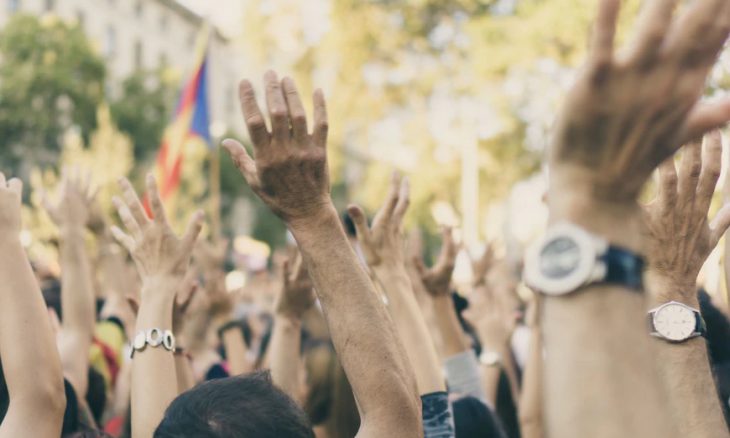The Controversy over Peaceful Assembly

Amendment 1 to the Constitution, the first among the Bill of Rights, says the people have the right to peaceably assemble. It has often been closely tied to another freedom in the First Amendment—the freedom of speech. It is often also tied to the right to petition the government for a redress of grievances… protests.
Over the course of America’s history, this right has been often litigated in the nation’s courts. Whether it was picketing strikers in the 1930s, civil rights sit-ins in the 1960s, or Black Lives Matter protests in the 2020s, the right to gather with others is not limited. This applies whether for a political protest or just hanging out with friends on a street corner.
Assembly is the only right in the First Amendment that requires more than one individual for its exercise. One can speak alone, one can even redress a grievance alone, but no one can assemble alone. Protected assemblies can occur spontaneously, however, protection is also included for preparatory activity leading up to the physical act of assembling. The Supreme Court has recognized a distinct “right of association,” which does not appear in the text of the First Amendment.
Over the past few years, the freedom of peaceful assembly and association was restricted for the COVID-19 pandemic. Whether such a restriction was legitimate depends on a number of factors, for example, the severity of the situation and the exact measures taken. When restrictions on the freedom of assembly are made, it is up to governments to justify their actions.
The enforcement of some COVID-19 restrictions on California churches was challenged all the way to the U.S. Supreme Court. The high court blocked the California rule that prohibited indoor services in counties with the greatest spread of the virus, but allowed attendance caps based on the size of the building to stand. The justices did say singing in church could continue to be banned in those areas.
A Nevada limitation of 50 people on religious assemblies was deemed unconstitutional by the Ninth Circuit U.S. Court of Appeals. A three-judge panel of that court found the state’s order unlawful in that it was tougher on houses of worship than on businesses, which were then allowed 50 percent capacity.
A report from Indiana University’s MedicalXpress reported that, by the end of August 2021, twenty-one states had religious freedom laws prohibiting even minimal interference with residents’ right to practice their faith.
Even without the restrictions of COVID, a form of assembly not envisioned by the Founding Fathers is in social media. Freedom of assembly and internet communications have been highlighted in a 2020 report of the United Nations High Commission on Human Rights. The report focused on the “impact of new technologies on the promotion and protection of human rights in the context of assemblies, including peaceful protests.”
Social media, privately owned and barely regulated, wields enormous power over online speech and “free assembly.” The issue of their censorship is complicated. Florida has passed a law intended to prevent the platforms from “discriminating in favor of the dominant Silicon Valley ideology.” A similar law was struck down by the Supreme Court nearly 50 years ago. While the government cannot force platforms to carry certain speech or allow certain “friends groups,” that does not mean the largest platforms should engage in political censorship, either.
It has always been within the will of God that His people should gather together to hear the Word of the Lord (Deuteronomy 31:12-13) and to encourage one another to live righteously, doing good works to bring glory to Him. Ephesians 5:19-20 says, “Addressing one another in psalms and hymns and spiritual songs, singing and making melody to the Lord with your heart, giving thanks always and for everything to God the Father in the name of our Lord Jesus Christ.”
How then should we pray?
- That the nation’s courts would continue to uphold the right of people to peaceably assemble.
- That protestors would assemble in a non-violent manner and avoid destructive riots.
- For the leaders of cities to enforce the law regarding demonstrations that harm people and property.
- That the president’s administration and regulatory agencies would wisely consider long-term ramifications should they decide to invoke shutdowns for future health emergencies, such as the monkeypox outbreak.
- For your own commitment to assembling together with people of faith in Jesus Christ.





